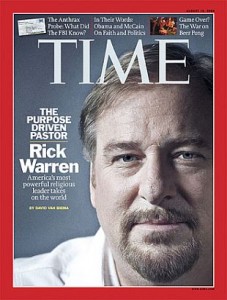SEVEN KEYS TO
AN EFFECTIVE MINISTRY
A Leadership Lifter from Rick Warren
Next to Jesus Christ Himself the greatest model of ministry is
the Apostle Paul. As you do your ministry, whether you’re a
Sunday School teacher or a lay pastor or any of the many
various ministries we have here at the church, you need to
constantly remember seven principles for an effective ministry.
In Romans 15, Paul gives us an inside view of his own ministry.
- 14 he says “I am myself convinced, my brothers, that you
yourselves are full of goodness, complete in knowledge,
competent to instruct one another.” Underline “you’re
competent to instruct one another.” Paul is saying that you’re
competent to minister. You’ve got what it takes. You don’t
have to feel “I could never do that.” But if you’ll just start
serving the Lord, He will give you the competence you need to
take those first steps.
The key words in Romans 15 are the words “minister” and
“service”. The word “minister” is used in v. 16 and the word
“service” is used in v. 17, 25, and 31. We’re going to look at
these Seven Keys to an Effective Ministry. But first a little
background.
If you read down this passage you’ll find that Paul had two
different types of ministries. A ministry to unbelievers and a
ministry to believers. His ministry to unbelievers is v. 14-22
was to share the good news. He says, “My mission in life is to
share the good news with as many people as possible.”
Specifically it was to share it with the Gentiles, those non-Jews.
He also then had a ministry to believers in v. 23-33. He tells us
his ministry was to meet the needs of believers.
What had happened here was Paul had collected an offering
from the Gentile churches all over Asia Minor to be delivered to
the Jews in Jerusalem who had become believers – the
Jerusalem church. The point I want to make is every Christian
needs a ministry and a mission. You need a ministry to
believers and a mission to unbelievers. Paul demonstrates this
here.
In v. 16 we have Paul’s message. He says here that his message
was the good news. That’s a good thing to have to share. The
mission in life is not to go out and tell people that they’re dying
and going to hell but to go out and tell them that they can be
forgiven and they can go to heaven. That’s something I can get
excited about. It’s a positive message. It’s a message of good
news.
Paul’s motive in v. 17 was to bring glory to God. He wanted to
bring glory to God in everything that he did. Every time you
share your faith with somebody, you bring glory to God. Every
time you tell the gospel to a friend, you bring glory to God. His
message was the good news. His motive was to bring glory to
God.
- 19, he tells us about the miracles that he did. He says that
they were all done by the power of the Holy Spirit. They
weren’t just something Paul worked up on his own. God did
miraculous things. We’ve heard some stories tonight how
God’s done neat things in the lives of people who were totally
dedicated to Him. They didn’t happen because of us. They
happened because of God’s Spirit.
- 19, Paul gives us his ministry area. He says it was from
Jerusalem to Illyricum. Illyricum is Yugoslavia. He is basically
saying, “My ministry area (and he had it defined) was from
Israel to Yugoslavia.” God used him in starting churches all
over there. That’s what most of the New Testament is about.
His method was starting new churches. He said in v. 20 “It’s
always been my ambition to preach the Gospel where Christ
was not known so I would not be building on someone else’s
foundation.” I had the same ambition as Paul. I didn’t want to
build on anyone else’s foundation. I wanted to just go and let
the Lord use me to start a church from scratch. One nice thing
about when you start a church yourself, you know that all the
problems in it are your fault. You don’t blame anybody else.
Frankly, you don’t have to put up with anybody else’s
problems either that you inherited. I can handle problems as
long as I know I created them. It’s much harder to deal with
problems you didn’t cause. Some of you have had to do that in
jobs that you inherited, clean up a mess that somebody else had
left.
That’s the background. I want to spend our time on these seven
keys of an effective ministry. Regardless of where God uses you
or how God uses you, it has to have these seven functions to
have God’s blessing on it.
- An effective ministry is based on God’s
grace.
- 15-16 he says, “Because of the grace God gave me to be a
minister of Jesus Christ to the Gentiles.” I think the first thing
you have to realize is that you don’t deserve to be in the
ministry. I don’t deserve to be a Christian, much less be in the
ministry. I don’t deserve forgiveness, much less to be able to be
used by God. That’s an extra, added privilege. Constantly, we
need to remind ourselves, God is using me in this place of
service, in the Saddleback body, simply because of His grace.
Grace is the fact that God knows every stupid mistake I’ll make
in the ministry and yet He has chosen me. That’s what grace is.
Just because you’re serving the Lord, doesn’t mean you’re not
going to make any mistakes. You will. Many times you’ll
stumble and you’ll fumble and you’ll do things that embarrass
yourself. You’ll do the wrong thing and you’ll say, “What in the
world am I doing?” Just because you’re a minister of God
doesn’t mean you’re perfect. You’re not. I’m not. None of us
are. Grace is the fact that God uses imperfect people. If He
only used perfect people to get the job done, what would get
done? Nothing. And if He only used super saints who are
mature in every area of life to get the job done, what would get
done? Nothing. We are all Becomers. We are all on the road. I
like to say that we’re maturing ministers. We’re not matured
ministers. We’re maturing ministers. While we’re growing,
we’re giving. While we’re growing, we’re serving. That’s the
goal – grace. Ministry is received not achieved. Just like
everything else in your life, it’s by grace. It’s a gift. Everything
God does in your life, through your life, for your life He does
by grace through faith. It’s not something you work for or earn.
You didn’t work for or earn your salvation. You don’t work or
earn the right to minister. It’s a gift that God gives us.
Sometimes people’ll say, “I’ve got too many faults for God to
use me.” I want to say, “You need to understand that ministry
is based on grace.” When somebody comes to you and says,
“Who do you think you are serving there in lay ministry at
Saddleback?” You say, “Wrong question. It’s not who I think I
- It’s who is God?” Then you say, “I’m a trophy of God’s
grace.” That’s what we all are – trophies of God’s grace. He
uses very ordinary people.
- An effective ministry is not only based on
God’s grace; it’s built on God’s word.
He says, “I have the priestly duty of proclaiming the gospel of
God.” What is the gospel? The Bible. This is the guidebook for
ministry. Not anything else. I want to encourage you as a
member of the CORE to particularly become well acquainted
with 1 and 2 Timothy and the book of Titus. You, as someone
who’s involved in ministry in your church, need to be very
familiar with these books because they’re written to people in
the ministry. As you read these books, read them as Paul were
writing not to Timothy or Titus, but directly to you. They are
guidelines for service. The guidelines that are given in Timothy
and Titus are guidelines we want all the people in our church
who are serving in the CORE in the ministry to be involved in.
It’s based on God’s word.
Acts 20:32 “I give to you the word of grace which is able to
build you up.” 2 Timothy 3:16-17 “All Scripture is given by
inspiration of God and is profitable for doctrine, reproof,
correction and instruction in righteousness that the man or
woman of God may be thoroughly furnished unto every good
work.” Phillips translation: “That we may have the
comprehensive equipment to serve God.”
This is our equipment, our manual, our tool.
- The third mark of a ministry that God
really blesses is it’s done for God’s glory.
It’s not built to promote a personality. Paul wanted people to
be more impressed with God than he wanted people to be
impressed with himself. “Therefore I glory in Christ Jesus in
my service to God. I will not speak of anything except what
Christ has accomplished through me.” He says God did it
through me. He serves in the ministry for the glory of God.
This is one of the things that really concerns me about super
stars out there in ministry. It’s very important we realize that
God does things through people. Many times what happens
when you start serving in ministry is that your gifts start to
develop in one area. They get bigger and bigger and bigger.
Spiritual gifts are like muscles; the more you use them, the
bigger they get. You’re gifted in a certain area and God’s using
that but you know of other areas that aren’t up to snuff yet.
You say, “How in the world can I be teaching a Sunday School
class? I’m still struggling in….” You need to realize that your
gift is always bigger than you are. You need to realize that God
often gives His greatest gifts to the weakest people. Why? So
that we lay humble before the Lord. And that we trust Him
and we don’t think that it all depends on us.
The person who is totally competent in every area of their life,
I’m not interested in them serving in our church. The one thing
that God judges faster than anything else is pride. And the
moment you become filled with pride, God takes His hand of
blessing off your ministry. I’d much rather have somebody
who recognizes his great strengths but also sees his weaknesses.
Humility is being honest about your weaknesses and
recognizing that your strengths are gifts from God. You don’t
have to be ashamed of your strength or say you’re not strong in
that area. You are. Just recognize who gave it to you. God gave
it to you. Some of you are good with numbers. Some of you
are good with words. Some of you are good with people. Some
of you are good at organizing. Some of you are good at crafts.
Some of you have musical talent. Others of us… tough luck!
We’re prison singers – always behind a few bars and never
have the right key. We have a voice that needs to be cultivated
– plowed under! But the Bible does say, “Make a joyful noise.”
Even pigs can do that! They’re happy when they’re eating.
But the fact is you are a bundle of strengths and weaknesses.
You recognize your strengths are from God and you work on
your weaknesses at the same time. You do it all for the glory of
God.
Some people think Paul had an ego problem. I used to think he
did. Six or seven times in the New Testament, Paul says,
“Follow me as I follow Christ.” Would you ever say that to
somebody? I don’t think I’d ever say that. I used to think,
“What kind of ego trip is this guy on?” Then I realized he was
just being honest. He was making an attempt to live for Christ.
He wasn’t saying he was perfect. He was saying, At least I’m
trying. I’d rather have people follow somebody who’s at least
making the effort than following somebody who’s making no
effort at all — some rock star or something. You should be able
to say with confidence, “Follow me as I follow Christ.” It does
not mean you’ve got it all together. You’re never going to have
it all together until you get to heaven. But you need to be able
to say, “Follow me as I follow Christ because my heart is in this
direction. That’s where my heart is. That’s where I want to go.
That’s where I want to be. I’m not perfect but that’s where I
want to be.” So we help people in that kind of ministry.
- A ministry that is effectively blessed by
God is performed in God’s power.
He says, “By the power of signs and miracles, through the
power of the Spirit, I fully proclaimed the gospel of Christ.” In
John 15:5 Jesus is talking. He says, “I am the vine, you are the
branches. If a man remains in Me and I in him, he will bear
much fruit. But apart from Me you can do nothing.” If you are
not preparing yourself spiritually for the ministry you’re in —
whether you’re a greeter or an usher or a hostess or whatever,
it’s not counting. But if you are spiritually preparing yourself,
saying, “Lord, I realize that today in our church there will be
5000 plus people who will come across this patio. May I just
touch a few of them with the love of Jesus Christ.” Then it
counts. You do it in the power of the Holy Spirit. You don’t
just do it in the power of your own personality. Some of you
are just naturally vivacious. But what impresses people in a
spiritual sense is when somebody’s had their heart prepared
and love is just coming through them. You can tell. Even if
you’ve only got a split second chance to pat somebody on the
back, or care for them, it makes a difference.
Zechariah 4:6 says, “`Not by might, nor by power, but by My
Spirit,’ says the Lord.” 1 Corinthians 2. Notice how Paul
ministered. Many of us think that Paul was a super confident
guy, always felt like he knew everything, had it all together,
never had any doubts or fears or failings. “When I came to you,
brothers, I didn’t come with eloquence or superior wisdom. As
I proclaimed to you the testimony about God I resolved to
know nothing while I was with you except Jesus Christ and
Him crucified. I came to you in weakness and fear and in much
trembling. My message and my preaching were not with wise
persuasive words but with a demonstration of the Spirit’s
power so that your faith might not rest on men’s wisdom but
on God’s power.” God says He’d rather take a weakling and
use them. Why? Because people will say, “It must be God. I
know that person. Look how God is using that person’s life to
effectively change other people, to touch children, youth,
college students, men, women, businessmen in our church.
Ordinary people being used in extraordinary ways.” That’s
what God wants to do. It’s performed in God’s power. On my
strength alone, I can’t do it. But on God’s strength “I can do all
things through Christ who strengthens me.”
- The ministry that is effective, that God
blesses, is planned according to God’s
purpose.
Paul says, “It’s always been my ambition…” Circle that. Is it ok
to have ambition? Sure it is. You’d better have an ambition.
Your ambition better be to fulfill God’s life mission for your life
and the ministry that He’s given you. Paul says, “It’s always
been my ambition to preach the gospel where Christ was not
known. But now there is no more place for me to work in these
regions. I plan to do so when I go to Spain.” Notice that Paul
made plans. Some of you think you should just get up in the
morning and say, “Lord, what do You want me to do today?”
and kind of free-float through life. I don’t think so at all. I
think life’s too important to go without a plan. I think we need
to be strategic. If you read the book of Acts, Paul had a very
clear strategy. His strategy was to go to the key cities in the
Roman Empire and all the places he went — Ephesus, Corinth,
Philippi, Colosse, all these major places were all trade centers,
travel centers, crossroads in the Roman Empire. He said I know
I can’t get everywhere so I’m going to go to the most strategic
places I can and spread the Gospel there.
God has given us a tremendous privilege of being in one of the
most strategic places in America. Orange County has such a
powerful influence on California. And California has such a
powerful influence on the United States. And the United States
has so much powerful influence on the world. If I knew a more
strategic place to be, I’d leave for it tonight. I want my life to
count. If we can reach the people in this area – the movers and
shakers of Orange county – we will have made a significant
dent in the devil’s territory.
Paul was strategic. Fortunately we’re in a strategic area. So we
need to take this very seriously. People sometimes think
planning is unspiritual but I suggest you read all these Proverbs
I’ve listed because they all talk about how God says He wants
you to plan. The Bible says it’s foolish not to plan. The wise
person plans. That’s why I’ve passed out these questions. Our
staff is continually planning and saying, “God, You’ve taken us
here so far. Now where do You want us to go tomorrow?”
We’re always looking forward and planning. Why? Because
souls are in the balance. We’re talking about heaven or hell
here and eternity in the balance for many lives. We take it very
seriously to plan and strategize and say what is the maximum
way to use our resources for the glory of God and take the most
people to heaven with us as we can on the way, while we’re
having fun! Because you rarely do something unless you have
fun in doing it anyway. Fortunately, ministry is fun. It’s hard,
but it’s fun. Somebody asked Billy Graham, “Do you ever get
tired of ministry?” He said, “I get tired in the ministry but I
don’t get tired of the ministry.” That’s true of me. I get tired in
the ministry, but never tired of it. There is nothing more
significant than helping influence people’s lives in a positive
way for the Good News. That’s what you’re doing.
- It’s supported by God’s people.
Here he’s specifically talking about financial support. But I
think it’s talking about financial support in every way. He says,
“For Macedonia and Achaia were pleased to make a
contribution. Indeed, they owe it to the Jews to share with
them their material blessings.” I look out at Saddleback Valley
and see guys and ladies in their 20’s and 30’s at an economic
level that it took their parents 60 or 70 years to get to. Some of
their parents never got to that level. You’d probably agree that
it’s easier to climb the ladder of success faster than it used to be.
Many people in this area are living at an economic level that
was a lifetime goal in the last generation to eventually get to
and they’re already there and they’re still at a young age. Now
you say, “What am I supposed to do with the rest of my life?”
If there’s anything I want to say to this Valley is, It’s time to
give something back. “To whom much is given, much is
required.” We give back of our time, back of our money, back
of our energy and our service.
That makes me think of a story of one time a pastor was
preaching down in the south. He was getting all wired up and
says, “This church has got to get up and walk!” And all the
people said, “Amen, pastor! It’s got to walk!” Then he said,
“Folks, our church has got to get up and run. We’ve got to run
with the Gospel.” And everybody said, “Amen, the church has
got to get up and run! Run with the Gospel.” Then he said, “I
tell you, brothers, the church has got to get up and fly! It’s got
to fly with the good news all over.” They said, “Yes, it’s got to
fly! Let it fly.” Then he said, “It takes money to fly.” And they
said, “Let it walk, pastor. Let it walk!”
It takes money to have a ministry. It takes our money and it
takes other people’s money. You don’t have to be afraid of that.
When you teach people how to give you’re doing one of the
greatest blessing you can do for them. You’re teaching them to
be like God because God is a giver. I used to be nervous about
sharing teaching on giving. But I’m not at all any more. In fact,
I love to teach on it. I know what it’s going to do for that
person. There are more promises regarding giving than any
other thing in the Bible. When I’m not being generous, I’m just
hurting myself.
- A ministry that’s effective is backed by
prayer.
He says, “Join me in my struggle [how?] by praying to God for
- Pray that I may be rescued from the unbelievers in Judea
and that my service in Jerusalem may be acceptable to the saints
there.” He says we join in each other’s ministry when we pray
for each other’s ministry. You, as a part of the body of Christ,
need to pray not just for the area of ministry you’re in but you
need to pray for all the other ministries. Together, we’re a
symphony. Everybody plays their part. The tunes are the same
but the sounds are different. An oboe doesn’t sound like a flute
and a flute doesn’t sound like a trumpet and a trumpet doesn’t
sound like a violin. But we’re all reading from the same score.
This is our score. The Bible. It tells us that we’re to go out into
the world and we’re to attract, win, and develop members into
mature models of Christlike character and conduct and help
them discover a ministry in the church and a life mission in the
world at each stage and segment of their lives. That’s our plan.
We’re all working toward it in various areas. Some people are
on the front end, the attraction end. Some people are at the
welcoming stage. Some people are at the incorporating stage,
bringing them into Bible studies. Some people are at the
training stage. Some people are at the sending out stage. Some
people are at the going out stage. But all together, it forms a
symphony and makes us the body of Christ. He says we need
to pray for each other.
About Rick Warren
Rick Warren is the founding pastor
of Saddleback Church in Lake Forest,
Calif., one of America’s largest and
most influential churches. Rick is
author of the New York Times
bestseller The Purpose Driven Life. His
book, The Purpose Driven Church, was named one of the 100
Christian books that changed the 20th century. He is also
founder of Pastors.com, a global Internet community for
pastors.
————————————————-
Rick Warren là con của một vị mục sư và chính bản thân ông cũng đã hiến dâng trọn cuộc đời mình cho việc rao giảng Tin Mừng của Chúa Cứu thế theo truyền thống của phái Tin Lành Southern Baptist. Ông tốt nghiệp bậc cử nhân tại California Baptist University ở Riverside, bậc cao học về Thần học tại Southwestern Baptist Theological Seminary ở Fort Worth, Texas và bậc tiến sĩ về mục vụ tại Fuller Theological Seminary ở Pasadena, California.
Ông thừa nhận mục sư Billy Graham, giáo sư Peter Drucker và mục sư Jimmy Warren người cha của ông là những vị trong số những cố vấn đáng tin cậy nhất của mình (mentor).
Năm 1975, sau khi được truyền chức mục sư, Rick Warren làm lễ thành hôn với Kay Lewis sinh trưởng ở San Diego trong một gia đình có người cha cũng là một vị mục sư. Hai ông bà có 3 người con hiện đều đã trưởng thành và 4 cháu nội ngoại. Cả hai người cùng hợp tác trong việc truyền đạo và phát triển cộng đoàn tín hữu từ con số vài trăm người lúc mới thành lập tại Saddeback trong thành phố Lake Forest vào năm 1980 lên đến con số trên 20,000 tín hữu vào năm 2005. Với số tín đồ thường xuyên tham dự thánh lễ và các sinh họat rất đa dạng hàng tuần đông đảo như vậy, Saddleback Valley Community Church đã trở thành một “Megachurch” đứng hàng thứ 8 trong số trên 1,200 “đại giáo đoàn” của toàn nước Mỹ hiện nay. Megachurch là một hiện tượng tiêu biểu cho phong trào phát triển tôn giáo rất mạnh mẽ, lôi cuốn được hàng triệu tín đồ của các giáo hội Tin lành trong vòng 50 năm qua tại nước Mỹ và cả tại Đại Hàn.
Song song với việc phát triển cơ sở mục vụ này, Rick còn đóng góp rất tích cực vào việc đào tạo, hướng dẫn cho trên 400,000 mục sư và giới chức lãnh đạo hội thánh trên toàn thế giới, dựa theo tinh thần đã được phác họa trong cuốn sách xuất bản lần đầu năm 1995, được bán rất chạy, với nhan đề là “The Purpose Driven Church”.
Rick Warren lại còn nổi danh hơn nữa với cuốn sách được xếp vào loại bán chạy nhất (bestseller), mà hiện đã lên đến 30 triệu cuốn, đó là cuốn sách có nhan đề “The Purpose Driven Life”. Người viết sẽ giới thiệu chi tiết hơn về hai cuốn sách này trong một dịp khác.
Với số lợi tức thu nhập thật lớn lao do việc bán sách, vào năm 2005 Rick Warren đã hoàn lại cho nhà thờ toàn bộ số lương bổng ông nhận được trong 25 năm với cương vị một mục sư. Và còn hơn thế nữa, ông tiếp tục đóng góp cho nhà thờ 90% số lợi tức thâu nhập của mình, thay vì số 10% mà người tín đồ thường đóng góp vào công quỹ của hội thánh, được gọi là “tithe” (thập phân).Và ông bà tiếp tục sống thanh đạm trong căn nhà nhỏ bé, với cái xe cũ kỹ, chứ không hề có một biểu hiện xa hoa nào của một gia đình triệu phú thường tình.
Đọc thêm tại: https://vietbao.com/a240523/muc-su-rick-warren-va-su-nhap-cuoc-tin-do-ton-giao
 Hướng Đi Ministries
Hướng Đi Ministries












